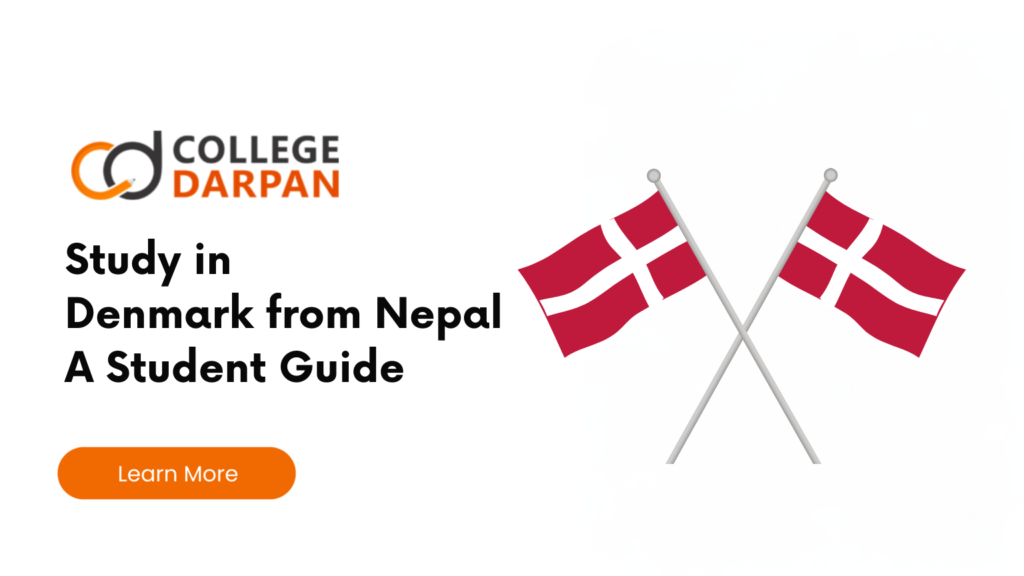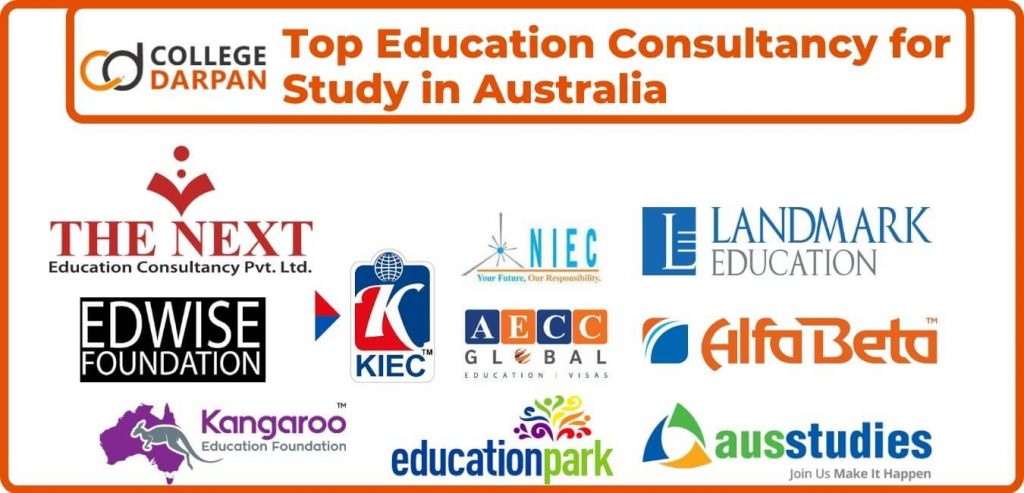Denmark, with its cutting-edge technology and progressive society, is a magnet for international students seeking a world-class education and an enriching cultural experience. If you’re a Nepalese student considering studying abroad, Denmark offers a compelling package: excellent academics, a high quality of life, and a welcoming atmosphere. Denmark attracts students looking for a top-notch education in various fields, including engineering, social sciences, business, and health sciences.
Want to Study in Denmark? Sign Up for a Free Consultation Session
Facts about Denmark
- Denmark is one of the world’s happiest countries.
- Danish higher education institutions offer more than 500 English-taught programs.
- Denmark has a strong economy and is known for its innovation and research.
- Denmark ranks highly in terms of quality of life and human development.
- Danish universities are internationally recognized for their high academic standards.
- Denmark is a leader in sustainability and green energy.
Reasons to Study in Denmark
Academic Excellence
- Renowned Universities: Danish universities consistently rank among the best globally, boasting high academic standards and innovative teaching methodologies. You’ll be challenged and nurtured by professors who are experts in their fields.
- Focus on Practical Skills: Unlike rote learning, Danish universities prioritize real-world application. Expect to develop critical thinking, problem-solving skills, and creativity—essential for success in today’s job market.
- Diversity of Programs: Explore a vast array of programs across various disciplines, from engineering and business to environmental science and social sciences. Find the perfect program to align with your academic interests and career aspirations.
- English-Taught Programs: Many programs in Denmark are taught entirely in English, eliminating any language barrier that could hinder your learning experience.
Benefits Beyond Academics
- Multicultural Hub: Denmark embraces diversity. Studying here allows you to connect with a vibrant international community, fostering a global perspective and lifelong friendships.
- High Quality of Life: Denmark consistently ranks as one of the happiest countries. This translates to excellent healthcare, a safe environment, stunning landscapes, and a healthy work-life balance.
- Post-Graduation Opportunities: A Danish degree holds weight internationally, giving you a competitive edge in the global job market. Additionally, Denmark offers post-study work visa options, allowing you to gain valuable professional experience after graduation.
Danish Education System | Study in Denmark from Nepal
Danish Education System
Denmark boasts a well-established education system with a strong emphasis on critical thinking and practical application. Here’s a breakdown of its structure:
- Primary Education: Compulsory for children ages 6-16, focusing on core subjects and fostering social skills.
- Secondary Education: Divided into lower secondary (age 12-15) and upper secondary (age 16-19) tracks, offering a variety of academic and vocational programs.
- Higher Education: Universities (universiteter) and academies (akademier) provide bachelor’s degrees (bacheloruddannelser), master’s degrees (kandidatuddannelser), and Ph.D. degrees (ph.d.-grader) across various disciplines.
Student Visa Process for Denmark
To study in Denmark, you’ll need a student visa. Here’s a step-by-step guide:
- Gain Acceptance: Apply and get accepted into a recognized Danish educational institution. They’ll issue a Confirmation of Enrollment (CoE) letter.
- Visa Application: Visit the official Danish Immigration Service website (https://www.nyidanmark.dk/en-GB) for the latest visa application procedures and requirements. Submit the application along with your CoE, proof of financial support, health insurance, and English language proficiency test results.
- Interview: You may be called for an interview at the Danish embassy or consulate in your home country.
Cost to Study in Denmark
Tuition fees in Denmark vary depending on the university, program, and level of study.
Public vs. Private Universities
- Public Universities: Generally free for EU/EEA students. However, non-EU/EEA students, including Nepalese students, typically pay tuition fees ranging from €6,000 to €16,000 per year.
- Private Universities: Charge tuition fees for all students.
Program and Level of Study
Tuition fees can vary depending on the specific program and level of study (undergraduate, postgraduate). Master’s degrees tend to be more expensive than bachelor’s degrees.
Living Expenses
In addition to tuition fees, factor in living expenses such as accommodation, food, transportation, and course materials. While Denmark can be a relatively expensive country, there are ways to manage costs. Student housing options are generally more affordable than private rentals, and budgeting can help you make the most of your finances.
Estimated Annual Tuition Fees for International Students
| Level of Study | Average Annual Tuition Fees (in EUR) |
|---|---|
| Undergraduate | €6,000 – €16,000 |
| Postgraduate | €8,000 – €20,000 |
| Doctoral Degree | €6,000 – €16,000 |
| PhD | €8,000 – €20,000 |
Note: The cost mentioned above is based on estimated figures from the college and university average and does not confirm the fees you may pay.
Top Universities in Denmark
Denmark is home to several world-renowned universities, each with its strengths:
- University of Copenhagen (UCPH): Consistently ranked among the best globally, UCPH excels in life sciences, humanities, and social sciences.
- Technical University of Denmark (DTU): A leader in engineering and technology, DTU offers cutting-edge programs in sustainable energy, robotics, and information technology.
- Aarhus University: Renowned for its research focus, Aarhus University boasts strengths in medicine, natural sciences, and business administration.
- Copenhagen Business School: A top business school in Europe, CBS specializes in economics, finance, and management.
- University of Southern Denmark: This comprehensive university offers programs in engineering, health sciences, social sciences, and humanities.
- Aalborg University: Known for its innovative problem-solving approach, Aalborg University focuses on engineering, social sciences, and humanities.
Best Cities to Study in Denmark
- Copenhagen
- Aarhus
- Odense
- Aalborg
- Esbjerg
Popular Courses in Denmark
| S.N | Course |
|---|---|
| 1 | Engineering |
| 2 | Business and Management |
| 3 | Environmental Science |
| 4 | Computer Science and IT |
| 5 | Social Sciences |
| 6 | Architecture |
| 7 | Health Sciences |
| 8 | Design and Fashion |
| 9 | Media and Communication |
| 10 | Humanities |
Cost of Living in Denmark
| Expense Category | Average Monthly Cost (in EUR) |
|---|---|
| Accommodation | €400 – €800 |
| Groceries | €200 – €300 |
| Eating Out | €150 – €250 |
| Public Transportation | €40 – €60 |
| Utilities | €100 – €200 |
| Internet and Mobile | €30 – €50 |
| Entertainment | €100 – €200 |
| Personal Care | €50 – €100 |
| Clothing | €50 – €100 |
Health Insurance in Denmark
Health insurance is an essential requirement for international students studying in Denmark. Here are some key points about health insurance in Denmark:
Public Health Insurance
All residents in Denmark, including international students, are covered by the public health insurance system, which provides access to a range of medical services.
Coverage and Benefits
The public health insurance covers general medical consultations, hospital treatments, and emergency services. However, dental care and certain specialist treatments may not be fully covered.
Registration
Upon arrival in Denmark, students need to register with the local Civil Registration System (CPR) to obtain a health insurance card (yellow card) which provides access to healthcare services.
Additional Insurance
Students may choose to purchase additional private health insurance to cover services not included in the public health system, such as dental care, physiotherapy, and elective surgeries.
It is important to understand the terms and conditions of the health insurance coverage and seek clarification from the relevant authorities or insurance providers regarding any queries or concerns. Exploring different insurance options and choosing a plan that provides adequate coverage and meets your specific requirements is recommended.
Scholarships in Denmark
Denmark offers a wide range of scholarships for international students to support their studies. These scholarships are offered by universities, government organizations, and various institutions. Scholarships in Denmark can provide financial assistance, cover tuition fees, cover living expenses, or both. They are awarded based on academic merit, leadership qualities, research potential, or specific criteria related to the field of study.
Job Opportunities in Denmark
Denmark provides many job opportunities for international students. Here are some key points about job opportunities in Denmark:
Work Right
International students with a valid student visa are generally allowed to work part-time during their studies. They can work up to 20 hours per week during the academic term and full-time during scheduled breaks.
Availability of Jobs
Denmark has a strong economy and a diverse range of industries, offering job opportunities in sectors such as hospitality, retail, administration, healthcare, and more. Major cities like Copenhagen, Aarhus, and Odense have a higher concentration of job opportunities.
Minimum Wage
Denmark does not have a statutory minimum wage, but wages are generally high compared to other countries. The average hourly wage for student jobs is around €12-€15.
Job Search Support
Danish universities and institutions often provide career services and job placement assistance to help students find employment opportunities. They offer resources, workshops, and guidance on resume writing, interview skills, and job search strategies.
Post-Study Work Opportunities
After graduation, international students may be eligible for a work permit extension, allowing them to work in Denmark for a period of time depending on their level of study.
Frequently Asked Questions (FAQs)
What is the process for applying to study in Denmark?
The process for applying to study in Denmark varies depending on the institution and program. Generally, you will need to apply to the institution, provide required documents such as transcripts and proof of English language proficiency, and pay an application fee.
What is the duration of study programs in Denmark?
The duration of study programs in Denmark varies depending on the level of study. Bachelor’s programs typically last 3-4 years, master’s programs last 2 years, and PhD programs last 3 years.
Can I work while studying in Denmark?
Yes, international students in Denmark can work part-time during their studies and full-time during scheduled breaks. The number of hours you can work depends on your visa conditions.
Is it necessary to learn Danish to study in Denmark?
While many programs in Denmark are taught in English, learning Danish can be beneficial for daily life and increasing job opportunities. Some institutions offer Danish language courses for international students.
What are the living expenses in Denmark?
Living expenses in Denmark vary depending on the city and lifestyle. On average, students can expect to spend around €800-€1,200 per month on accommodation, food, transportation, and other expenses.
How do I apply for a student visa to Denmark?
To apply for a student visa to Denmark, you need to be accepted into a recognized Danish educational institution and receive a Confirmation of Enrollment (CoE) letter. Then, you can apply for a student visa at the nearest Danish embassy or consulate, providing required documents and attending an interview if necessary.

